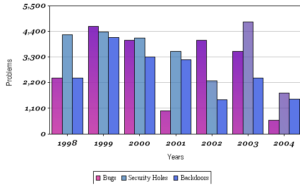▮ Task 1 採点基準 首尾一貫性とつながり
問題にグラフが出ようが図表が出ようが、文章構成は一緒です。この文章構成さえ決めてしまえばどんな問題が出てきても対応できますし、決められた文章構成に従って書くことによって、文章全体に「首尾一貫性」が生まれるのです。
文の流れは, イントロダクション(導入)➡ ボディ(本論)となります。
(結論はイントロダクションに入れる、又は最後に書いてもいいですが必ずしも書く必要はありません)

▮ イントロダクション(導入)
グラフ・図表が何を表しているのか1〜3文で表現します。 そして、1文目には、以下の4つの要素が含まれなければなりません。
① フォーマットのタイプは何か?
(例:円グラフ/ 折れ線グラフ/ 棒グラフ/ 表/ 図表 )
② それは何を示しているのか?
(例:コンピューターの製造台数/ 販売された販売された車の割合)
③ それはどこのことか?
(例:ヨーロッパ、アジア/ 5工場、6店舗、7事業所)
④ それはいつのことか?
(例:1月から12月 / 1990年〜2005年)

① The line graph ② reveals the amount of overtime pay workers earned
折れ線グラフで 従業員の残業代の総額を示している
③ in three restaurants ④ between January and June 2003.
3つのレストランでの 2003年1月〜6月間の
2文目では、どのような規模で情報が提示されているかを記述します。
⑤ 数字はどのように示されているか?
(例:のべ人数 / 金額 / パーセント / 時間)
⑤ The figures for the overtime pay are shown in American dollars.
残業代の金額は米ドルで表示されている。
イントロダクションの最後の3文目では、一般的にトレンド全体を解説し、それを要約の文章と考えます。(3文目の要約はイントロダクションに必ずしも入れなくて構いません。この要約を最後の結論部分に入れても良いでしょう。)
⑥ トレンド全般を要約するとどうなるか?
(例:増加している / 減少している / 変化が大きい / 割合が低い)
⑥ According to the chart, the levels of pay at all three restaurants increased over the period.
チャートによると、この時期3つのレストランすべてで、支払いが増加した。
結果として、イントロダクション(導入)には全部で6つのポイントが含まれることになりました。
The line graph reveals the amount of overtime pay workers earned in three restaurants between January and June 2003. The figures for the overtime pay are shown in American dollars. According to the chart, the levels of pay at all three restaurants increased over the period. (46 words )
▮ 本論 Body の評価を上げる

さて、イントロダクション(導入)に続き、今回取り上げるのはボディ(本論)の評価を上げる文章構成です。 採点基準である「タスク達成度」のポイントを「首尾一貫性とつながり」をもって文章を完成させる必要があります。
▮ 採点基準 タスク達成度 (問題に的確に答えているか)
Task 1では情報を正しく伝えることが求められます。その際、グラフや図表どちらが出ても分析力です。 一見英語には関係ないようですが、150語という限られた語数の中で伝えるべき優先順位を決めることが大切です。実際に採点基準の中に「関係のない情報・正確でない情報が入っていないか」ということも含まれているのです。
伝えるポイントは次の3つ。
- グラフ・図表の全体の傾向
- グラフ・図表の中で特徴的な箇所
- 2つ以上のグラフや図表が出ている場合、その違い又は比較する点
3つのポイントを「首尾一貫性とつながり」をもって書いていきます。
▮ データをグループ分けして、わかり易く説明する

チャートやグラフに多数のアイテムや数字が提示されている場合、情報をグループ分けしなければなりません。
- 類似のトレンドをもつアイテム (例:上げトレンド / 下げトレンド)
- 似た分野から発したアイテム (例:ドイツ、イギリス&フランス/ 日本、中国、韓国)
- 似たタイプのアイテム (例:ラジオ、テレビ、CDプレーヤー/ 電話、スマートフォン、E-メール )
▮ 記述するポイントを選ぶ
Task 1 で提示される情報の大半は、チャートやグラフです。受験者の課題は、チャートやグラフに示されているトレンド(状況が変化し、展開していく大まかな方法。傾向)と、その重要な特徴を読み取って、説明することです。
プロセスや図解の説明エッセイを書く場合、自分が重要だと認めたポイントを全て記述しなければなりません。 しかし、チャートやグラフや表の説明エッセイでは、これは当てはまりません。 通常、150語以上のレポートを完成させるには、記述すべき重要情報は8〜12個です。以下に着目して、タスクの中からトレンドや重要情報を記述します。

- 一番大きな数字のアイテム
- 2番目に大きな数字のアイテム
- 3番目に大きな数字のアイテム
- 一番小さな数字のアイテム
- 最も大きく変化したアイテム
- 2番目に大きく変化したアイテム
- 最も変化が小さいアイテム
- 似たようなパターンをもつアイテム
- 正反対のパーターンをもつアイテム
- まったく変化していないアイテム
- 特定の期間中、初期におけるアイテムの数字レベル
- 特定の期間中、終期におけるアイテムの数字レベル

































